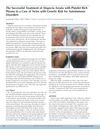3 citations,
July 2023 in “International journal of molecular sciences” Stress may contribute to hair loss in alopecia areata by affecting immune responses and cell death in hair follicles.
 November 2017 in “British Journal of Dermatology”
November 2017 in “British Journal of Dermatology” Genes controlling hair growth and immune response are disrupted in male pattern baldness.
 90 citations,
June 2006 in “The American Journal of Dermatopathology”
90 citations,
June 2006 in “The American Journal of Dermatopathology” The document concludes that accurate diagnosis of different types of hair loss requires careful examination of hair and scalp tissue, considering both clinical and microscopic features.
1 citations,
September 2016 in “Veterinary dermatology” A combination of ciclosporin and ketoconazole can effectively treat severe hair loss in dogs.
 October 2003 in “Journal of Investigative Dermatology Symposium Proceedings”
October 2003 in “Journal of Investigative Dermatology Symposium Proceedings” Mice treatments didn't grow hair, a patient treatment may affect immune response, and people with hair loss often feel anxious or depressed.
 October 2023 in “bioRxiv (Cold Spring Harbor Laboratory)”
October 2023 in “bioRxiv (Cold Spring Harbor Laboratory)” A protein called EGFR protects hair follicle stem cells, and when it's disrupted, hair follicles can be damaged, but blocking certain pathways can restore hair growth.
 23 citations,
June 2003 in “Journal of Investigative Dermatology Symposium Proceedings”
23 citations,
June 2003 in “Journal of Investigative Dermatology Symposium Proceedings” Alopecia Areata is an autoimmune disease affecting hair follicles, influenced by genetic and environmental factors, with rodent models being essential for research.
 3 citations,
January 2015 in “Nasza Dermatologia Online”
3 citations,
January 2015 in “Nasza Dermatologia Online” Some treatments for autoimmune hair loss work, but JAK inhibitors like tofacitinib are promising for regrowth.
 391 citations,
January 2010 in “Journal of The American Academy of Dermatology”
391 citations,
January 2010 in “Journal of The American Academy of Dermatology” Half of people with Alopecia Areata may see hair regrowth within a year without treatment, but recovery is unpredictable.
 January 2024 in “Journal of Biosciences and Medicines”
January 2024 in “Journal of Biosciences and Medicines” Future treatments for androgenic alopecia may focus on reactivating hair follicle stem cells and improving drug delivery.
38 citations,
January 2017 in “PPAR Research” PPAR-γ helps control skin oil glands and inflammation, and its disruption can cause hair loss diseases.
 72 citations,
January 2001 in “Drugs”
72 citations,
January 2001 in “Drugs” Minoxidil and finasteride treat hair loss; more research needed for other options.
 10 citations,
March 2014 in “Scandinavian journal of clinical and laboratory investigation”
10 citations,
March 2014 in “Scandinavian journal of clinical and laboratory investigation” Malondialdehyde-modified DNA may trigger an immune response in alopecia areata patients.
 56 citations,
November 2010 in “Pigment Cell & Melanoma Research”
56 citations,
November 2010 in “Pigment Cell & Melanoma Research” Brain hormones significantly affect hair color and could potentially be used to prevent or reverse grey hair.
 January 2018 in “Hair transplant forum international”
January 2018 in “Hair transplant forum international” PRP injections can effectively treat alopecia areata.
 3 citations,
January 2019 in “Indian Journal of Dermatology”
3 citations,
January 2019 in “Indian Journal of Dermatology” Transverse scalp biopsy sections help diagnose different alopecias by showing hair follicle details and inflammation patterns.
35 citations,
July 2008 in “Dermatologic therapy” Cicatricial alopecia may be caused by immune attacks on hair follicles, gland issues, or stem cell damage.
5 citations,
October 2012 in “Veterinary Pathology” A Doberman Pinscher had a rare form of autoimmune disease causing hair loss and other severe symptoms.
 2 citations,
February 2014 in “Hair therapy & transplantation”
2 citations,
February 2014 in “Hair therapy & transplantation” Alopecia Areata is an autoimmune condition causing hair loss, influenced by genetics, environment, and possibly improved by anti-MIF therapy, with many patients experiencing regrowth within a year.
 3 citations,
June 2023 in “Frontiers in medicine”
3 citations,
June 2023 in “Frontiers in medicine” Oxidative stress may contribute to hair loss in alopecia areata and antioxidants could potentially help as a treatment.
 March 2019 in “Applied sciences”
March 2019 in “Applied sciences” Laser therapy might help regrow hair in alopecia totalis better than steroids alone.
16 citations,
January 2022 in “International journal of molecular sciences” Certain daily habits like stress, diet, and sleep can affect the severity of hair loss in alopecia areata.
 January 2024 in “Pan African Medical Journal”
January 2024 in “Pan African Medical Journal” Non-scarring hair loss is common in lupus patients and can be diagnosed with specific hair and tissue tests.
April 2024 in “Cosmetics” Wigs help improve self-esteem and quality of life for people with hair loss from alopecia areata.
 April 2024 in “Frontiers in pharmacology”
April 2024 in “Frontiers in pharmacology” Brepocitinib 30mg is most effective for moderate-to-severe alopecia areata, but ritlecitinib 50mg may offer a better balance of safety and effectiveness.
 21 citations,
January 2024 in “Science Immunology”
21 citations,
January 2024 in “Science Immunology” Regulatory T cells protect hair follicle stem cells by maintaining immune privilege in the skin.
 295 citations,
January 2006 in “Journal of the American Academy of Dermatology”
295 citations,
January 2006 in “Journal of the American Academy of Dermatology” Alopecia areata, a common autoimmune hair loss condition, often runs in families.
26 citations,
September 2009 in “Clinical genetics” Arab APS1 patients have unique and recurrent AIRE gene mutations.
51 citations,
December 2017 in “Skin Appendage Disorders” Stress may trigger hair loss by affecting immune protection in hair follicles.
 150 citations,
October 2010 in “The American Journal of Pathology”
150 citations,
October 2010 in “The American Journal of Pathology” The document concludes that more research is needed to better understand and treat primary cicatricial alopecias, and suggests a possible reclassification based on molecular pathways.




















